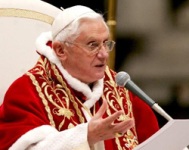Pope recalls drowned migrants, urges global landmine ban
 Vatican City - Pope Benedict XVI in his Palm Sunday address recalled the deaths of scores of mostly African would-be immigrants in the Mediterranean and also urged all nations to outlaw landmines and cluster bombs.
Vatican City - Pope Benedict XVI in his Palm Sunday address recalled the deaths of scores of mostly African would-be immigrants in the Mediterranean and also urged all nations to outlaw landmines and cluster bombs.
Speaking to the faithful gathered in St Peter's Square, the pontiff said it was with "great pain" that he remembered the over 230 migrants feared to have drowned when their vessel capsized off Libya a week ago.
"We cannot just accept such tragedies," said Benedict, stressing how the migrants died while "trying to reach Europe".
The scale of the problem involving migrants fleeing their often violence and poverty-stricken countries requires "urgent coordinated strategies between the European Union and African states," the pontiff said.
"Also measures are needed to prevent migrants from relying on unscrupulous human traffickers," Benedict said.
The current global economic crisis is exacerbating the migration problem the pontiff said and can only be solved when "the African people, with the help of the international community, free themselves from poverty and wars."
Benedict also referred to international treaties to ban anti- personnel mines and cluster bombs, saying that countries who have yet to adhere to these should do so "without delay".
Over 155 countries have ratified the treaty on land-mines with the notable exceptions including the US, China, India and Russia.
Before his noon Angelus address, Benedict celebrated Palm Sunday Mass which ushered in a week set to culminate with the Roman Catholic Church's Easter feast next Sunday.
Tens of thousands of faithful held aloft palm leaves as the 81- year-old pontiff led a procession into St Peter's Square commemorating when Jesus rode a donkey into Jerusalem to triumphant acclaim.
Benedict in his Mass homily, cited St John's Gospel, contrasting Jesus' enthusiastic welcome into Jerusalem with his death on the cross just a few days later.
"No life can be fulfilled without sacrifice," Benedict said, referring to the Christian belief that Jesus' sacrificed his life to save mankind.
"What is required is for all of us to accept one another, and in doing so, renounce something of ourselves," Benedict said.
"If I glance back at my own life, I have to say that the most important moments were those when I gave up something," Benedict said. dpa